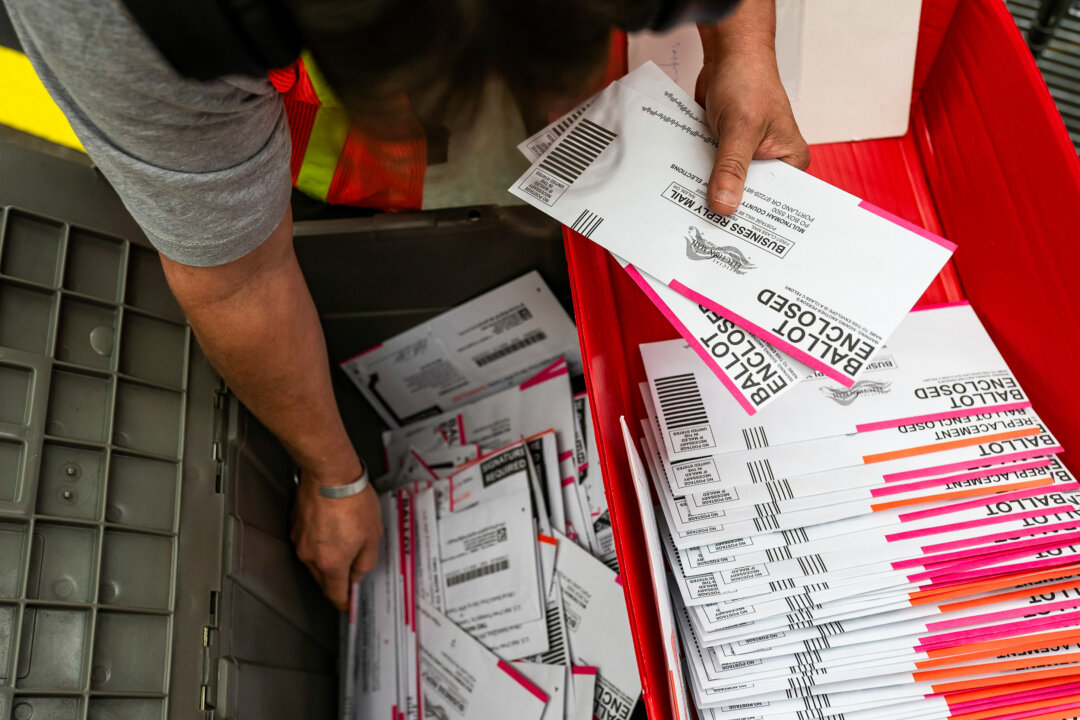The secretary of state’s chief of staff said that the agency is now confident the rolls have been fully vetted and the 2024 election won’t be affected.
Nearly two weeks after discovering that hundreds of noncitizens registered to vote in Oregon, more details emerged in testimony before state lawmakers on Sept. 25.
Oregon’s automatic voter registration system has come under fire since the secretary of state’s office and the state transportation department disclosed on Sept. 13 that more than 306 people had mistakenly been added to the voter rolls without providing proof of U.S. citizenship.
In its original disclosure, the transportation department stated it had discovered its own errors in adding noncitizens to the voter rolls and that two noncitizens had voted illegally.
During the hearing, Department of Transportation Director Kris Strickler acknowledged that the Department of Motor Vehicles discovered the errors only after an inquiry from the Institute for Responsive Government, a Chicago-based nonprofit. He also acknowledged that the number of noncitizens registered to vote had grown to 1,259, and that 10 of them had gone on to vote.
Witnesses confirmed that there were no double-check safeguards in place at ODOT or at the secretary of state’s office to ensure noncitizens were not registered to vote through the state’s automatic registration program before the error came to light.
They said safeguards are now in place.
“Should we have been looking at this sooner than a few months before the election?” asked DMV administrator Amy Joyce in her testimony. “Obviously, yes. But when we were posed with the question, we dug in. And when we found something, we brought it forward.”
Issue Resolved?
ODOT and elections officials insisted that the issue has been corrected and was not large enough to have affected the outcome of any prior election.
Ben Morris, the chief of staff for Oregon Secretary of State LaVonne Griffin-Valade, testified that the agency is now confident that the rolls have been fully vetted.
“This issue will have no impact on the 2024 election. We were able to catch the error in time,” Morris said.
The secretary of state’s office immediately deactivated the voter registration in all 1,259 cases, Elections Director Molly Woon testified. All those affected will be notified of the change by Sept. 27 and given instructions in 13 languages for how to reactivate their voter registration if they can prove their citizenship.
If any of the identified individuals has voted illegally, they will be referred to the Oregon Department of Justice for potential prosecution, Woon said.
“Automatic voter registration through the DMV remains the most trusted and secure method of engaging our citizens in democracy,” she said.
Wrong Option
Eligible residents who receive driver’s licenses or state ID cards are automatically registered to vote in Oregon, whether they request it or not, based on the state’s motor voter law, which took effect in 2016.
In 2021, the state began to allow noncitizens to obtain driver’s licenses under House Bill 2015. That bill removed the requirement for proof of legal presence in the U.S. when applying for a standard driver’s license or ID card in the state.
But ODOT was still tasked with verifying citizenship before transmitting information to the secretary of state’s office for voter registration. Once the law took effect, DMV began accepting a broader set of identity documents, including foreign passports and birth certificates, to issue driver’s licenses and ID cards.
DMV has since made about 1.4 million transmissions of information.
According to ODOT, the mistake resulted from DMV staff selecting the wrong option on a computer menu when listing applicants’ identifying documents.
“This was a clerical error. We have a drop-down menu of documents that people can provide to prove their identity and age in DMV transactions, and that menu defaulted to a U.S. passport or U.S. birth certificate,” Joyce testified.
She said her agency has fine-tuned the program it uses to register voters and trained staff on its proper use.
Proactive Steps
In a joint statement issued after the hearing, Republican members of the House Committee on Rules said their party has “long cautioned that automatic voter registration would lead to problems such as noncitizens being registered to vote.”
They claimed that their concerns had been dismissed and that the Democratic majority had assured them that safeguards were in place to protect the integrity of the registration process. “Testimony today indicated that those safeguards, in fact, were not in place and the problem would not have been caught without an inquiry from an outside entity,” the statement said.
More must be done, they said, to ensure that Oregon’s elections are secure.
They intend to introduce legislation requiring that the Oregon secretary of state perform voter roll audits and verify the eligibility status of voters registered through the motor voter program.
Oregon Gov. Tina Kotek on Sept. 23 directed the state DMV to take additional proactive steps to protect the integrity of the motor voter program.
She directed DMV to provide updated training to all relevant staff members, initiate a data integrity review, and produce recommendations for improved data management by the end of the year. She also tasked DMV with completing a comprehensive after-action report within two weeks explaining their corrective actions and how they are ensuring such errors will not occur again.
In 2023 Oregon’s DMV suffered a massive data breach in part because of its sharing of DMV data with the secretary of state’s elections division for voter registration purposes.
Republicans also expressed concerns relating to an Oregon law signed by Kotek in 2023 that automatically registers Oregonians who apply for the Oregon Health Plan, the state’s Medicaid program.
Like the motor voter law, it would register untold numbers of new voters who have not expressed a desire to register to vote, they said. Because Oregon mails unrequested ballots and allows ballot harvesting, Republicans are concerned the new law may provide a trove of potential voters for ballot harvesters to target.

